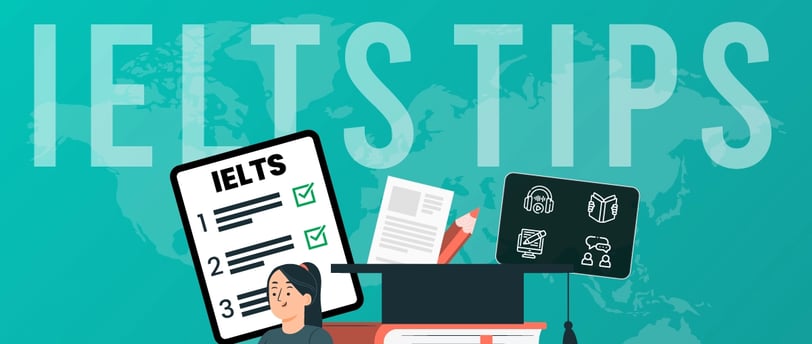Top 9 IELTS Listening Tips & Strategies To Improve Your IELTS Score
Looking for IELTS listening tips Check out this detailed guide on IELTS listening tips, tricks strategies be assured of perfect scores in IELTS listening test!
10/8/20232 min read


Introduction
The IELTS (International English Language Testing System) test stands out as one of the most widely recognized and accepted tests in English language proficiency exams. Scoring well in the IELTS is crucial for individuals looking to study or work in English-speaking countries. One of the four components of the IELTS test is the Listening section, and mastering this skill can significantly boost your overall score. In this article, we will explore the top 9 IELTS listening tips and strategies that will help you improve your IELTS score.
Understanding the IELTS Listening Test
Before diving into the tips and strategies, it's essential to understand the structure of the IELTS Listening test. This section consists of four parts, each with a unique format and set of challenges. Let's break it down:
Part 1: Conversations in Everyday Contexts
Part 1 typically presents a conversation set in a daily life scenario. This may involve interactions at a hotel, in a social setting, or at a workplace. It serves as an introduction to the listening test.
Part 2: A Monologue in an Everyday Context
In this section, you will listen to a monologue related to an everyday situation, usually a speech or presentation. It's essential to grasp the main ideas and details.
Part 3: Conversations in an Educational or Training Context
Part 3 involves a conversation between two or more speakers in an academic or training environment. Understanding the context and the relationships between speakers is crucial.
Part 4: A Monologue on an Academic Subject
The final part presents a monologue related to an academic topic. This section is often considered the most challenging as it tests your comprehension of complex ideas and vocabulary.
Now that we understand the test's structure, let's explore the tips and strategies to excel in each part.
Top 9 IELTS Listening Tips & Strategies
Familiarize Yourself with Various Accents
IELTS listening passages may feature accents from different English-speaking regions. To prepare effectively, expose yourself to various accents through podcasts, movies, and online resources.
Practice Active Listening
Actively engage with the audio material by taking notes while listening. Jot down key points, keywords, and any numbers or dates mentioned. This will help you recall information accurately.
Predict What's Next
Develop the skill of predicting the speaker's next words or ideas. This proactive approach can help you stay ahead and grasp the context more effectively.
Improve Your Vocabulary
Enhance your English vocabulary, especially in academic and technical fields. A robust language will enable you to comprehend complex topics in Part 4 of the test.
Focus on Listening to Specific Information
You'll be asked to find specific information in some sections, such as names, dates, or prices. Sharpen your ability to pinpoint these details within the audio.
Recognize Transition Signals
Pay attention to transition words and phrases like "however," "on the other hand," or "in conclusion." These signals provide valuable clues about the speaker's train of thought.
Simulate Test Conditions
Practice under timed conditions to simulate the real test environment. This will help you manage your time effectively during the exam.
Use Your Time Wisely
Before each section begins, you have a short time to review the questions. Use this time to skim through the questions and underline keywords.
Stay Calm and Stay on Track
Lastly, maintain your composure during the test. If you need help with an answer, don't dwell on it. Focus on the upcoming questions and keep your concentration.
Conclusion
Mastering the IELTS Listening test is crucial to achieving your goals of studying or working in an English-speaking country. Following these top 9 IELTS listening tips and strategies can significantly improve your IELTS score and enhance your overall English language proficiency.
